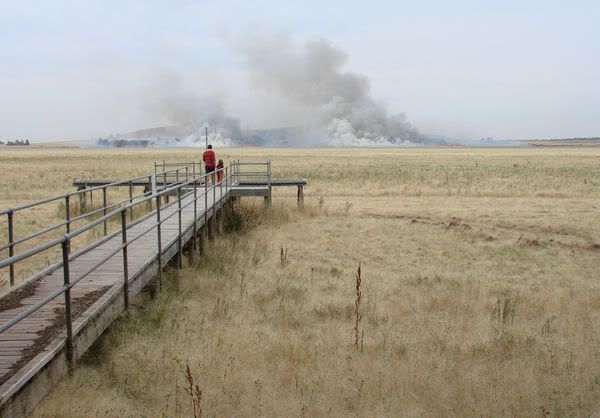 Now that the Republican Health Care Reform legislation of the early 90's has been passed with no Republican votes, I've been musing on the Path Ahead.
Now that the Republican Health Care Reform legislation of the early 90's has been passed with no Republican votes, I've been musing on the Path Ahead.The Path Ahead on Health Insurance Reform
The path ahead for health insurance reform seems straightforward, at least for as long as the Republicans remain trapped in a strict "Repeal" stance by the angry and noisy opposition to health insurance reform that corporations have stirred up in their base.
First step, electorally punish those Conserva-Dems who voted against reform, so that the "Rockefeller Republicans" who now call themselves Democrats after the alliance of "Taft Republicans" and Dixiecrats purged from the Republican party are less aggressive in undermining progressive policy.
And the second steps are labelled "2a", "2b" and "2c", because they can operate in parallel.
- Second step, 2a, introduce a Medicare Buy-In for the health insurance exchanges.
- Second step, 2b, scrap the RomneyCare Individual Mandate and replace it with a 4% Employer Mandate, with the payment made into the employee's health insurance exchange account.
- Second step, 2c, accelerate the expansion of Medicaid.
Third step, accelerate the introduction of the health program.
Fourth step, allow states to opt their state exchanges into a regional exchange, with the opt-in required for the large number of state exchanges that will have an inadequate variety of policies available.
In order to get any or all of steps 2 into place, language has to be included in the 2011 budget resolution that always any or all of them to proceed via reconcilation. Then if the serious flaws with the RomneyCare version of health care exchanges have been corrected, the health care exchanges can be put into place
It has always been a misnomer to call the current legislation "health care reform" when it has always been primarily health insurance reform. Yet there is a necessary-through-not-sufficient relationship that applies here. Just as arriving at a less broken health insurance system was necessary to even apply bandaids to the health care system, a not-at-all broken publicly administered, not-for-profit health insurance system will allow actual reform of the health care system to proceed.
But then, thinking about how to organize to work for progress on Health Insurance Reform leads to thinking more broadly about achieving progressive social change in the face of our thoroughly corrupted political establishment.
Thinking Ahead by Looking Back
Every once in a while, I finish another chapter of 1831: Year of the Eclipse. I've just finished the chapter talking about the party politics - the Anti-Mason party, the National Republicans, soon to rename themselves the Whigs, Jackon's Democrats, and the petticoat rebellion that led to the dismissal of Jackson's first cabinet.
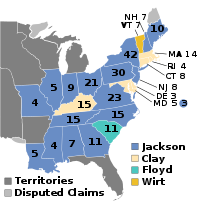 But I've also read some bits and pieces about what is coming up next ... especially for the Whigs. Any electoral college website bears the footprint of what was coming next. In 1832, Clay running as a National Republican, and refusing a fusion ticket with the Anti-Masons, would come second to Jackson ... but the only other candidate receiving more than a single state.
But I've also read some bits and pieces about what is coming up next ... especially for the Whigs. Any electoral college website bears the footprint of what was coming next. In 1832, Clay running as a National Republican, and refusing a fusion ticket with the Anti-Masons, would come second to Jackson ... but the only other candidate receiving more than a single state. After running an unsuccessful split ticket, involving Harrison, Clay, and several others, designed to deny outright victory to the Democrats and throw the election into the House of Representatives, in 1840 the Whigs ran Harrison, as a "hero of 1812" (who had actually won his victory before the peace treaty was signed), who won election.
After running an unsuccessful split ticket, involving Harrison, Clay, and several others, designed to deny outright victory to the Democrats and throw the election into the House of Representatives, in 1840 the Whigs ran Harrison, as a "hero of 1812" (who had actually won his victory before the peace treaty was signed), who won election.In 1852, the Whigs refused to nominate their own incumbent President Fillmore, and lost with General Winfield Scott.
 Then in 1856, the Whigs in their last convention nominated Fillmore, who was no longer a member of the Whig Party.
Then in 1856, the Whigs in their last convention nominated Fillmore, who was no longer a member of the Whig Party.Of course, what tore the Whigs apart was the Great Issue of the Day - Slavery. The Pro-Slavery Whigs purged the anti-slavery Whigs (including, for example, Abraham Lincoln) from their party but were then unable to maintain coherence as a coalition of state parties and collapsed.
 By the last gasp of the Whigs, the 19th Century Republican Party had already been formed by pasting together a coalition of anti-slavery Whigs, abolitionists, former Know Nothings, Free Soilers, and others. The rest, as they say, is history.
By the last gasp of the Whigs, the 19th Century Republican Party had already been formed by pasting together a coalition of anti-slavery Whigs, abolitionists, former Know Nothings, Free Soilers, and others. The rest, as they say, is history.But what is the Great Issue of the Day
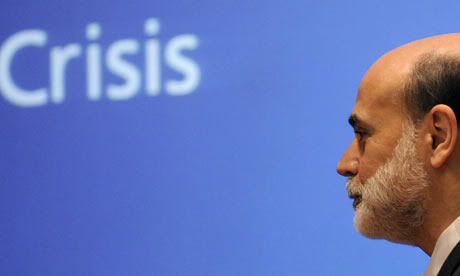 It may seem like we face a blizzard of issues, rather than one. But of course, there is a single source for that blizzard of issues. The great issue of the day is Corporate Feudalism.
It may seem like we face a blizzard of issues, rather than one. But of course, there is a single source for that blizzard of issues. The great issue of the day is Corporate Feudalism.With the Republicans firmly entrenched in the most extreme of pro-feudalist camps, and the Democrats divided between "pro-reformed-feudalism" (quite like the pro-slavery Whigs "regulation of the worst excesses of abusive slaveholders") and anti-feudalists, the Democrats of today are in a position quite similar of the Whigs of the 1840's.
From climate chaos through Peak Oil through the cancer epidemic through the military industrial complex shredding our Constitutional rights in pursuit of slightly higher profits for the quarter ... there is a common core to the blizzard of issues that we face.
Now, given the real world conditions, there is no need for a Leninist strategy of deliberately monkey-wrenching things to radicalize the situation. The real world is already throwing monkey wrenches and will throw more and more over time.
We need to build organizations - no need to call them political parties, since they would be what political parties at one time used to be, not what political parties are today - that can take over city hall through the ballot box and put in effective emergency measures if the shit hits the fan. Movements. Likely distinct movements in different, overlapping, regions.
Up from there, we need to have a balance of power position in state legislatures to prevent the state legislature from blocking what needs to be done locally, which includes freeing up the ballot box and keeping it free.
But What Can an Individual Town Do if the Shit hits the Fan?
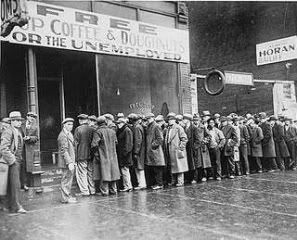 Consider the basics of a serious economic convulsion (and, no, the Panic of 2008, while a deep recession, was not an economic convulsion on the magnitude of what we face in the next two decades). People need shelter and a place to eat.
Consider the basics of a serious economic convulsion (and, no, the Panic of 2008, while a deep recession, was not an economic convulsion on the magnitude of what we face in the next two decades). People need shelter and a place to eat.Now, even in the Great Depression, three quarters of the population was still employed. Even in Weimer Germany when a wheelbarrow was required to carry the bills to buy a load of bread ... there were people with wheelbarrows buying bread. There is a wide range of "serious problem" between the worst we have experienced since WWII and the worst that an economy can experience without descending into "Mad Max" territory.
A local community will still have some tax revenue, and some ability to obtain resources from the regional and national economy. However, the financial resources will fall far short of the need.
Now, suppose that the national government does not do what it could do, establishing a Job Guarantee program to ensure that labor resources are mobilized and put to work to cope with the challenges that we face. While it is certainly possible for the national government to take effective action - it is by no means guaranteed.
A local community is not powerless. With enough "volunteers", it is possible to grow food in community gardens. With enough "volunteers", it is possible to keep watch on those gardens at night and prevent a loss of the harvest through praedial larceny. With enough "volunteers", it is possible to cook and serve the harvest, combined with imported staples from the region or nationally, in community kitchens. With enough "volunteers", it is possible to keep a much larger number of people fed than can be done with local community US$ tax revenues alone.
In the face of economic convulsions, some buildings will fall vacant, and their owners will be unable to meet their property tax obligations. With enough "volunteers", large open interior spaces in big box or medium box stores can be refitted into livable shelter for individuals and families. With enough "volunteers", the problems of maintaining utilities and retrofitting the buildings to be more self sufficient can be addressed. With enough "volunteers", it is possible to keep a much larger number of people housed in livable accommodation than can be done with local community US$ tax revenues alone.
And why would people volunteer? Well, suppose that you are unemployed, and in return for volunteering to help, you can receive vouchers good for meals at community kitchens, and shelter in community housing.
Indeed, suppose that the local community allows local businesses to meet part of their property tax with volunteer vouchers in lieu of payment. Then with vouchers, you could also obtain additional amenities, beyond just food and shelter.
Of course, it would be difficult to operate any substantial share of an automobile based transport system on this basis ... since gasoline needs to be paid for in whatever currency the petroleum exporter will be demanding in the midst of an economic convulsion. But bicycle based transport ... that is something different, with a far smaller imported input component.
The Headliners: Midnight Oil
So, anyway, I've been thinking about the path ahead. What about you?
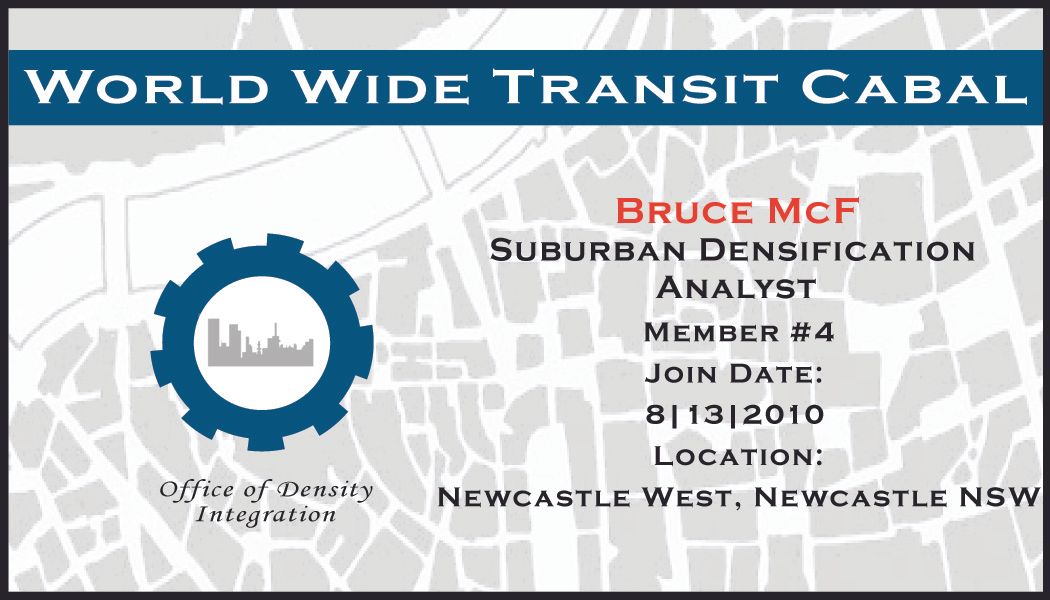

No comments:
Post a Comment